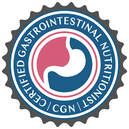|
If you do not or cannot drink cow's milk (or goat and sheep) and rely solely on non-dairy milks, then this post is for you! It's high time for a nut milk makeover!! Not only to boost your health and keep your wallets a bit more full, but also to keep you out of the grocery store as often during these quarantine days. The only tools you need to make a creamy, rich, and smooth nut milk is a high speed blender and a fine mesh nylon nut milk bag. It's soooo simple to make and the quality and cost far outweighs what you can buy at the store. I know I might be preaching to the choir, but there is no shame in repeating it---because we all get lazy, me included. So here is some inspiration to cultivate a nut milk routine. WHY YOU SHOULD PRIORITIZE HOMEMADE NUT MILK Firstly, commercial nut and grain milks are expensive when really they shouldn't be. For example, Califia Almond Milk (which is one of my preferred commercial brands because it doesn't contain carrageenan and is fortified with calcium), costs ~$5 for 6 cups of nut milk. The ingredient list is as follows: water, almonds, natural flavors, calcium carbonate, sunflower lecithin, sea salt, locust bean gum, gellan gum, potassium citrate. For 45kcal per cup you get 450mg of calcium (via calcium carbonate fortification), and about 5 conventional almonds. That's it, for 80 cents per cup of non-organic nut milk. Wow. Secondly, commercial nut and grain milks (and yogurts), are often lacking in calcium because the ingredients are naturally low in calcium. This is unfortunate because dairy free diets if not properly implemented with the guidance of a dietitian or knowledgeable health care provider, may contribute to calcium deficiencies. Some brands, like Califia, are fortified...which is great. However, they use calcium carbonate, a calcium supplement that has a low absorption rate. In addition, absorption is further compromised in situations where individuals have low stomach acid. As we age, we naturally produce less stomach acid, therefore the elderly struggle the most. However, even younger individuals live with inadequate stomach acid levels due to chronic stress, use of TUMS and PPIs, H. pylori infections, hypothyroid, etc. Furthermore, calcium carbonate can be constipating, and cause gas and bloating. So long story short, it's not ideal for many individuals, especially if you are dealing with digestive issues. Thirdly, store bought nut milks contain a lot of stabilizers like locust bean gum, gellan gum, guar gum, xanthan gum, carrageenan, etc. Although these ingredients are deemed safe by the FDA, they may contribute to digestive symptoms such as bloating or discomfort in some individuals. I personally, try to limit gums and additives when possible. IS THE COST AND TIME WORTH IT?? Heck yes! Why spend so much $$ on commercial non-dairy milks for such little quality?? If you are only getting 5-6 almonds per cup, with a good dose of poorly absorbed calcium carbonate, and a handful of fillers, why not make your own with a variety of nuts and seeds?!? What is the cost? For organic, raw, sprouted, and fortified Mineral Rich Pumpkin Seed Milk, I spent close to $2.00 for a 48oz serving (including the fortification with supplements). This comes to about 35 cents per cup. Now, who can beat that price for the quality? If I wanted to increase the creaminess with a full cup of pumpkin seeds versus just a 1/2 cup, it would come to $3 for 48oz, or about 50 cents per cup. If you compare that to a commercial equivalent, Elmhurst Unsweetened Milked Almonds (which provides 19 almonds per cup and costs about $7), it would cost you about $1.75 per cup....and the nuts are not even organic, nor is there calcium added. So, you definitely come out on top if you make it at home. And if you think it takes too much time, think again. From start to finish it takes about 5 minutes to make homemade nut milk. Much less time than a quick grocery store run. THE EVER CHANGING MINERAL RICH NUT MILK So my version of nut milk, is not just any nut milk. Most recipes you see on the web are for almond milk, cashew milk, sunflower milk, etc. Yeah they are great, but why not mix it up a bit? Each nut and seed has unique nutritional benefits. Almonds are rich in vitamin E and magnesium, Brazil nuts are rich in selenium, pumpkin seeds are rich in magnesium and zinc, sesame seeds are rich in calcium, and on and on it goes. Why stick with just the same old almond, cashew, or even oat? Why not make a super rich and creamy nut/seed milk that is always changing?? In addition to choosing a variety of different nuts and seeds, I also make sure to add an easily absorbed powdered calcium supplement, either calcium citrate or whole bone meal powder. Calcium citrate is absorbed about 25% better than calcium carbonate and it does not require stomach acid for absorption. Sometimes, I also like to add sunflower lecithin powder for added creaminess and emulsification. Without the sunflower lecithin, homemade nut milks tend to separate. Plus there is an extra bonus because sunflower lecithin is an excellent source of choline! Unfortunately, 90% of Americans are not consuming adequate amounts of choline per day. Foods richest in choline include liver and egg yolks, as well as animal proteins. Some plants provide choline (Brussel sprouts, soy, and broccoli) but in much lesser amounts. Generally, women need at least 425mg per day and up to 550mg if they are breastfeeding. Therefore, sunflower lecithin can be a great tool for anyone limiting the previously mentioned foods. HIGHLIGHT ON MY CURRENT FAVORITE NUT & SEED COMBO Brazil Nuts These nuts are pretty amazing because just one nut meets over 100% of your daily selenium needs. What is selenium? It is a trace mineral that along with iodine, and zinc plays a very important role in healthy thyroid function and helps reduce oxidative stress within the body. A diet low in selenium can thus have far reaching effects on metabolism, energy, and ability to combat free radicals. However, as with everything too much can be harmful to our bodies as well. Since Brazil nuts are the most concentrated source of selenium, limiting yourself to 1-2 per day is all you need. Pumpkin Seeds If you haven’t incorporated pumpkin seeds into your life, you should start now. These tasty seeds are super rich in minerals zinc and magnesium, both of which are very important for optimal health. Interestingly, many people tend to be deficient in magnesium, either due to poor intake of whole grains, nuts and seeds, or also because the soil is becoming more depleted of this mineral. Either way focusing on getting more magnesium into your diet can have far reaching positive effects. Magnesium can help reduce headaches, reduce cramping, increase overall energy, control blood sugar, and just generally help reduce inflammation. Plus, organic pumpkin seeds are very cheap. What more do you want? GETTING NUTTY
So, get out your blenders, purchase a nylon nut milk bag (it makes all the difference, trust me), and get creative! Swap the pumpkin seeds for sunflower seeds for another low cost alternative, or use a variety of different raw nuts and seeds that you have available right now in your home. Either way, mixing it up, is the best. Out with the old, and in with the MINERAL RICH! No more slacking, it's time for a nut milk revolution!! Fortified Mineral Rich Pumpkin Seed Nut Milk Makes ~6 cups INGREDIENTS 1/2 - 1 cup raw organic pumpkin seeds (or whatever variety of raw nuts and seeds you wish to use) 1-2 organic Brazil nuts 2 tablespoons NOW Sunflower Lecithin Powder 3 teaspoons NOW Calcium Citrate Powder 1/4 teaspoon sea salt Splash vanilla (optional) 1-2 tablespoons maple syrup/honey or 1-2 pitted medjool dates (optional) INGREDIENTS Place the nuts and seeds into a bowl and cover with warm water. Allow the nuts and seeds to soak 4 hours or overnight. Strain and rinse the nuts and seeds and put them into the blender. Add 5 cups water and the remainder of the ingredients. Blend on high for 60 seconds or longer. Line a bowl with the nut milk bag and pour the nut milk into the bag. Squeeze out the milk, leaving behind the nut pulp and fibers. Discard. Add an extra cup of water to your bowl to increase volume to 6 cups if desired. Transfer to a large jar or bottle and store in the refrigerator for up to a week. Note: If you want to kick it up a notch you can also add 1 teaspoon of spirulina to the recipe. Read more about spirulina and its' benefits here, here, and here! Nutrition Facts (per cup)- using 1/2 cup pumpkin seeds: 90kcal, 3.2g protein, 4.5g carbs, 7g fat with 23% of daily value of calcium, 16% of magnesium, 45% selenium, 5% of iron and zinc, and 17% of choline.
4 Comments
When you look at the dairy shelves today there are many vegan options available. Usually, they are made from a nut or seed base. Lately, oat milk has been getting a lot of marketing press. But do these products really make the cut nutritionally speaking?? That is a great question! Making a smart choice can be really difficult if you do not know what to look for.
Although plant based non-dairy products can be a helpful alternative if someone struggles with a lactose or milk protein intolerance, they are often not as nutrient dense as you may think they are. Plant based yogurts and milks are commonly low in protein and calcium and high in added sugars, thickeners, and gums. You have to be very careful when selecting a product to make sure you are not missing out on certain nutrients that you would otherwise get from dairy milk products. PROTEIN CONTENT vs SUGAR CONTENT When comparing protein content most plant based milks and yogurts contain very little, usually about 1-3g per serving (unless it’s soy milk). On the other hand, 1 cup of regular milk or yogurt contains 8g of protein, while the Greek yogurt varieties contain up to 25g per cup! That is very significant when compared to their plant based counter parts. Unfortunately, both the plant and dairy based products are often sweetened with added sugars to increase palatability. This is more often true with plant based products because milk is naturally sweet from lactose. Even plain varieties of plant based yogurts often contain added sugar. If you combine this with their low protein content it is a recipe for increased blood sugar spikes and increased hunger shortly after consumption. Dietitian Tip: Choose a plant based product that contains more protein and less added sugar to help maintain satiety for a longer period of time and reduce blood sugar spikes. Plus, instead of adding more honey or maple syrup to plain yogurts or milks, pair them with fresh berries for a little high fiber sweetness and add a handful of nuts (or tablespoon nut butter) to increase the protein, fat, and fiber for more blood sugar support and increased satiety. Plant Based Yogurts with HIGH protein and LOW Sugar:
Plant Based Milks with HIGH Protein and LOW Sugar:
PROBIOTIC POTENTIAL As with dairy products the probiotic action of most plant based yogurts is very minimal. By the time yogurts reach your plate the number of live cultures is limited. Tanginess or tingling is often the characteristic of live, active fermentation which indicates higher probiotic potential. If you make your own 24 hour yogurt at home, whether dairy or plant-based, it will yield a much higher probiotic count than store bought. Dietitian Tip: GT’s CocoYo provides a live probiotic punch. Be aware it is VERY tangy and tingly which is not everyone’s cup of tea. Lavva Yogurts also promote that they have 50 billion units per cup, but what strains is not indicated. Nancy’s Oatmilk yogurts is another great option because it contains researched probiotic strains that have been shown to provide health benefits. MICRONUTRIENTS OF CONCERN Finally, if one must replace dairy products with their plant based alternatives due to intolerance or personal preference, one must consider what nutrients are being missed. Those of biggest concern are calcium, vitamin D, and iodine. Calcium: With an average daily recommended intake of 1000-1200mg, calcium is one of the biggest concerns. As many people know, calcium is essential for bone health. It also plays a role in cell signaling including regulating blood pressure, insulin secretion, nerve impulse transmission, and muscle contraction to name a few. Some plant milks and yogurts are fortified with calcium. However, if you are not careful, you can easily select one that is not fortified or contains very little thereby increasing your risk of calcium deficiency. For example, 1 cup of dairy milk or yogurt contains between 300-400mg of calcium. If you replace your 1-2 cups of dairy milk or yogurt with a non-fortified plant based product you are missing out on a lot of your daily needs! Dietitian Tip: Choose a plant based milk or yogurt that contains at least 20-25% of your daily value of calcium. Make sure to shake the milk container well prior to each use because the added calcium carbonate can settle at the bottom. Vitamin D: Vitamin D plays an important role in calcium absorption. Without adequate vitamin D individuals will not be able to obtain as much calcium from their diet. Since dairy is often fortified with vitamin D, it can be easy to lose out on this source of vitamin D if you switch to a plant based alternative. Unfortunately, in the Pacific Northwest you can only rely on the sun to provide vitamin D during the months of May through September. Dietitian Tip: Choose a plant based milk that is fortified with vitamin D and/or make sure your daily multivitamin provides 800IU of vitamin D3. Iodine: Finally, iodine is an essential nutrient for proper thyroid function and therefore directly effects metabolism. Dairy products are a main source of iodine in the American diet. Plant based milks and yogurts do not contain iodine. Keeping this in mind it is very important to replace iodine from other food sources including fish, seaweed, or iodized salt. Dietitian Tip: Sea Seasonings Dulse Granules or Eden’s Gomasio are fun ways to add a great source of iodine to your diet. If you don't like the flavor of seaweed, simply use iodized salt in cooking. CONCLUSION It is really hard to find a non-dairy milk or yogurt that has it all; protein, low sugar content, and 20% or more of your calcium or vitamin D, and not to mention a flavor profile that you like. Even the new oat milk craze doesn’t match up with only 3g of protein per cup. The items below are close to meeting most specifications, but are not perfect. Therefore, it is important to be aware of what you are getting out of your non-dairy product. Is it protein, micronutrients, or live probiotics? Or is it simply because it tastes delicious? Just make sure to be smart to avoid missing out critical nutrients in the long run. Best All Around Choices:
Dietitian Tip: If you have a favorite brand of non-dairy milk or yogurt and it is low in calcium consider stirring in 1/8th or ¼ teaspoon of KAL Bone Meal Powder per serving to increase the calcium content. |
AuthorLike to read? Then get your evidence based nutrition information here! All posts written by Selva Wohlgemuth, MS, RDN Functional Nutritionist & Clinical Dietitian Archives
August 2023
Categories
All
|
Providing custom functional nutrition therapy since 2015.
Follow HBN on Social Media!
©Happy Belly Nutrition, LLC 2015-2023
Proudly powered by Weebly
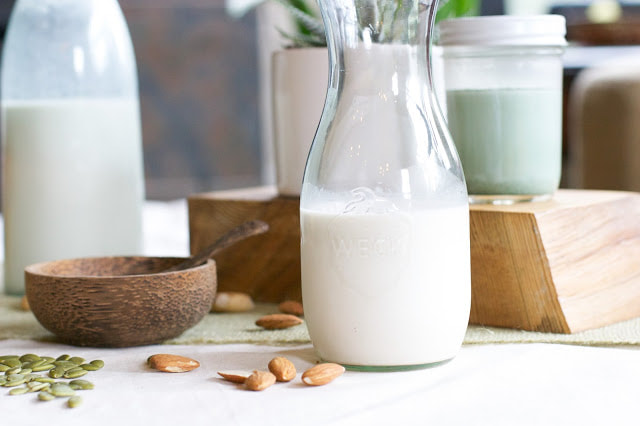


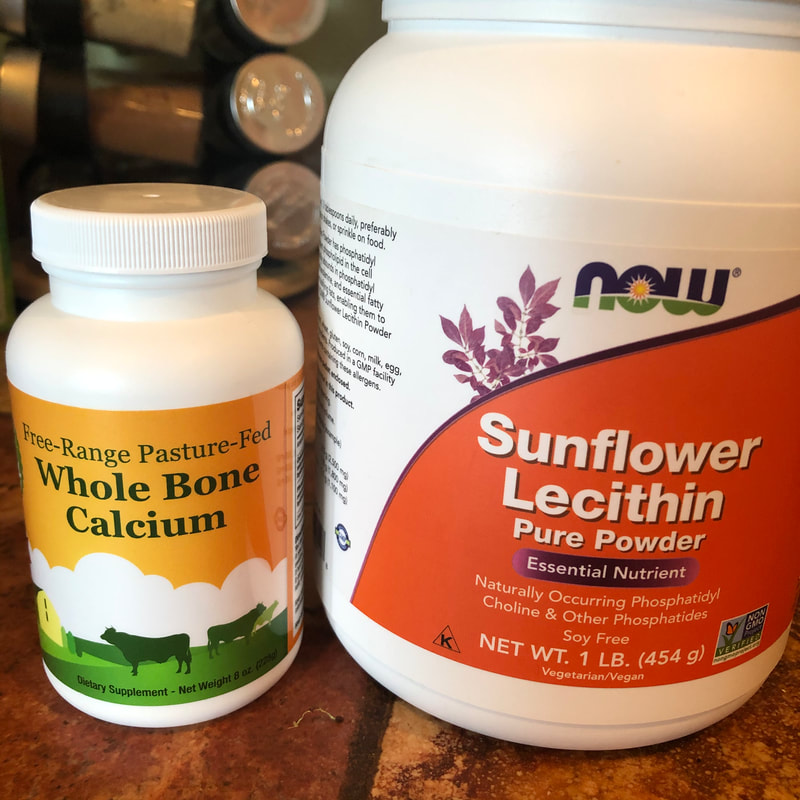
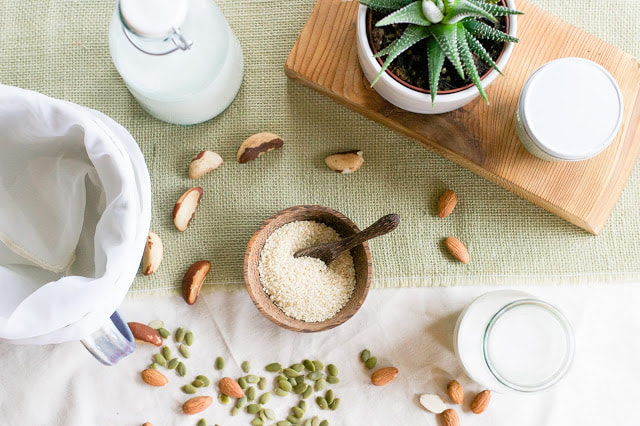
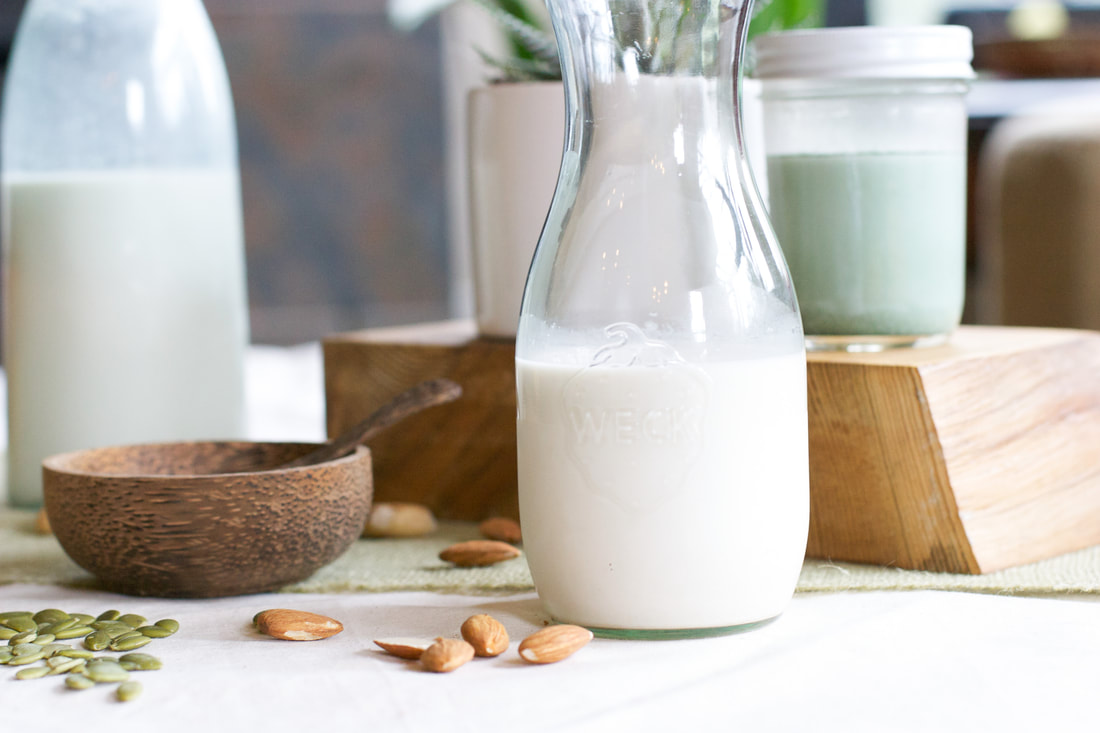
 RSS Feed
RSS Feed

